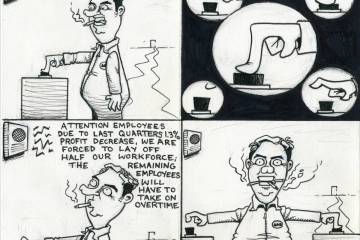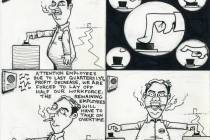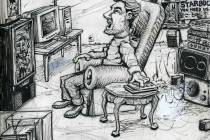Tim Burke: Ringing in the New Year with resolutions
This is the time of year when people are making their New Year’s resolutions. There is something about when one calendar year ends, and another begins that helps a person focus on a goal or initiate a change.
Research shows that someone who makes a New Year’s resolution is ten times more likely to achieve their goal than someone who tries at a different time of the year. Ultimately though, whether that goal is achieved or that change takes place rests solely on the willpower and commitment of the person that makes the resolution.
Resolutions can be simple and achieved quickly or they can be complex and take place over an extended period of time. A simple resolution could be that you decide to get a new hairstyle or buy a new outfit, or you are going to listen to some new music.
The end of one year and the start of another can also be a time when you decide it’s time to make some major changes in your life. You may decide it’s time to pursue a new career or go back to school.
You may decide that you want to travel or check off some items from your bucket list. Perhaps you make a resolution to start some new friendships or see family members you haven’t been in touch with for a while. Maybe you decide that the relationship you are in is not working out and it’s time to make a change. The most common resolutions are related to physical health. Perhaps you decide it’s finally time to quit smoking or lose a few pounds. The number one month of the year for new gym membership enrollments is January!
Making a resolution is the easiest part, it’s the follow-through that can be the hard part. For years, psychologists have been telling us that slow, steady, and incremental changes are the most effective.
If you are going to quit smoking perhaps your goal is to slowly cut down on the number of cigarettes smoked each day. Or if you want to lose weight you make a resolution to replace one meal a day with a vegetable juice drink or healthy salad. The theory is that these slow changes are easier for you to carry out and have long-term benefits, but new research is showing that radical, sweeping, and comprehensive changes are often easier for people than the small, incremental ones.
Why? It’s because the results from making small incremental changes take place slowly over a lengthy period of time. If you decide to lose weight and cut back a few hundred calories a week it may take several months before you notice that you have lost weight. By then you have probably given up because you didn’t see noticeable results right away and “it just didn’t work”.
Another reason radical change might be your best option is what is known as “the average of five” rule. The rule states that you become the average of the five people you spend the most time with. It is a simple concept that can be found at the foundation of human behavior, which happens to be what makes it so powerful.
This underlying cause is as follows: the combination of your self-image and beliefs is what determines your behavior. Sometimes the people around us alter our self-image and sometimes they don’t. However, as social creatures, we tend to adopt the characteristics of the groups we are a part of. We begin to associate ourselves with that group and the behavior that goes along with being in that group.
You see this behavior all the time. Overweight people tend to live in families that have overweight family members. Eating unhealthy and copious amounts of food is the norm for some families. If you are trying to lose weight it is hard to do so when family meals are loaded with carbs, fats, and sugars. Smokers hang out with smokers during breaks at work so hanging out with them during the smoke break and then not smoking takes more self-discipline than most people have.
If you are trying to limit your alcohol consumption going to a bar with friends is probably not a promising idea. It’s not a judgment on someone’s lifestyle, but it is an example of how we modify our behavior to “fit in”. Sometimes we need to make a “radical change” and take ourselves out of a situation that is not benefiting ourselves. We need to make a new “normal”.
Whether your resolution is simple or complex, easy or difficult, it won’t happen unless you really commit to it. Holding yourself accountable is the first step in following through with a resolution. Write it down, tell people, and use the buddy system.
Find a support group that can encourage you and educate you to help achieve your goal. You will make mistakes but if you maintain a belief in your ability to get the job done you will achieve your New Year’s resolution. Be patient with yourself. Most importantly, don’t give up!
Happy New Year.
Tim Burke is a businessman, philanthropist, educator and Pahrump resident. Contact him at timstakenv@gmail.com





















